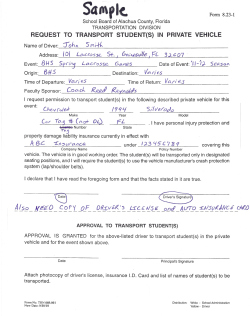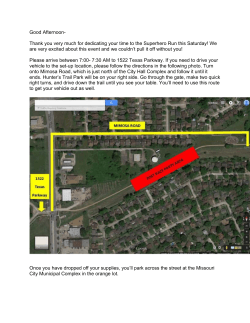
Advanced Driver Assistance System Using MSP430
ISSN(Online): 2320-9801 ISSN (Print): 2320-9798 International Journal of Innovative Research in Computer and Communication Engineering (An ISO 3297: 2007 Certified Organization) Vol. 3, Special Issue 2, March 2015 Advanced Driver Assistance System Using MSP430 R.S.Vishnudas1, M.Gopi2, S.Sarankumar3, K.Hariprasath4, S.Premkumar5 Assistant Professor, Department of Electronics and Communication Engineering, Narasu’s Sarathy Institute of Technology, Salem, Tamilnadu, India ABSTRACT: In this paper we introduce a real time operating system for the vehicle which improves vehicle safety and provides various automation facilities for the vehicle. An MSP430 microcontroller is used as the core controller in the smart vehicle so as to achieve a real-time operation system (OS). This controller works as the control system to operate the entire vehicle. The real-time controller enhances the performance of control and simplifies the design and management of software. In addition, this system uses speed control, automated breaking and horn blower along with an automatic air conditioning system. The utilization of high-precision of ultrasonic sensors on obstacle avoidance robot provides a guarantee for safety KEYWORDS: Embedded;MSP430;μC/OS;Smart vehicle I. INTRODUCTION Over the years various technologies were developed for improving the safety and automated facilities inside a car. But most of them were highly expensive and were not affordable by majority of the population. The efficiency of the developed system was also an issue. Most of them were not satisfying the promises made by them. Various automobile manufacturing companies have tried and developed number of systems on various processors, but the result was not satisfactory in overall and was also not cost effective. At the moment there are lot of vehicles which are coming with various driver assistance facilities such as seat belt warning, door ajar warning, electronically adjustable ORVM’s, obstacle detection, parking sensor, automated transmission, voice triggered engine etc. But most of them are not of major concerns and when them come in a package, they will cost us much. II. MOTIVATION Even though there are lots of advancements in the field of automobile technology, it is hard to find a package which make the driver comfort and feel safe at low cost .When it comes to satisfaction, it is difficult point out a vehicle which is comfortable, safe and at the same time affordable. III. RELATED METHOD At present different companies use different kind of processors such as ATMEGA,PIC controller, ARM 7 etc.These processors are mainly used for some specific applications and hence become complex when is used for multi processes. Other major concerns include cost of production, power consumption, complexity in design and the difficulties in interfacing and implementation. Even though various companies are providing higher security measures such as voice control systems they are highly expensive and are not affordable by a majority of the population.82% of the car owners in India uses low end cars which are priced bottom in the market, which points out the fact that all most 80% of the users are not used these kind of facilitations and assistance which in fact reduces the overall comfort and even keeps their life in danger due to the lack safety measures Copyright to IJIRCCE www.ijircce.com 6 ISSN(Online): 2320-9801 ISSN (Print): 2320-9798 International Journal of Innovative Research in Computer and Communication Engineering (An ISO 3297: 2007 Certified Organization) Vol. 3, Special Issue 2, March 2015 IV. OUR APPROACH We propose an advanced method for car security and automation using MSP430 microcontroller which is ultra low power consuming, cheap and highly compact. This paper aims at developing an ultra low power consuming and affordable assistance system for vehicles which ensures safety and various features like automatic speed control and breaking, automatic horn blower, voice recognition system, obstacle detection system and temperature sensitive air conditioning system. . Fig1: Architecture of MSP430 The methodology of this project design can be divided into two sections; hardware and software implementations. The hardware implementation consists of the development of the main controller, sensor network and the smart automation network. On the other hand the software implementation focuses on the programming of the microcontroller using IAR Embedded Workbench. V. MODULE 1 Module 1 deals with an ultrasonic obstacle avoidance system. It includes an ultrasonic transmitter and receiver circuit and a Signal Control Unit. Ultrasonic transmitter continuously emits ultrasonic radiations. Similarly the receiver end is used for collecting the reflected radiations from the obstacles if any. The sensor circuit is connected to a Signal Control Unit (SCU), which act as a comparator circuit. Here the comparator circuit continuously compares the time differences between the transmitted and received signals. From the time difference the output voltage of the processor also varies from which the distance of the obstacle will be calculated. Copyright to IJIRCCE www.ijircce.com 7 ISSN(Online): 2320-9801 ISSN (Print): 2320-9798 International Journal of Innovative Research in Computer and Communication Engineering (An ISO 3297: 2007 Certified Organization) Vol. 3, Special Issue 2, March 2015 Fig2: Block diagram of the proposed system Fig3:Obstacle detection circuit Copyright to IJIRCCE www.ijircce.com 8 ISSN(Online): 2320-9801 ISSN (Print): 2320-9798 International Journal of Innovative Research in Computer and Communication Engineering (An ISO 3297: 2007 Certified Organization) Vol. 3, Special Issue 2, March 2015 Fig4:Distance calculation using output voltage VI. MODULE 2 In this module an automated breaking system is used along with obstacle detection module. Here the obstacle will be detected at a distance as in the module 1; as a result the vehicle will be stopped at a closer point by the application of break gradually. The break will be applied from a point at which the obstacle is detected. Here a DAC is used for converting the digital signals from the processor in to analog signals. Fig5: Speed control circuit Here a control circuit is deployed which will be interfaced with the fuel injector in the vehicle. When the output of the MSP430 processor is high, the control circuit will regulate fuel injector valve in such a way that speed of the vehicle goes on decreasing thus stopping the vehicle at the maximum voltage value. Module 2 also includes an automatic horn blower system which is associated with the module 1.Here when the vehicle detects an obstacle it will automatically start blowing Horn, in order to make the other vehicles and pedestrians aware about the vehicle .Here the output of the processor is connected to a driver circuit which will trigger the horn. The driver circuit is used for switching the horn ON and OFF during presence and absents of an obstacle. Copyright to IJIRCCE www.ijircce.com 9 ISSN(Online): 2320-9801 ISSN (Print): 2320-9798 International Journal of Innovative Research in Computer and Communication Engineering (An ISO 3297: 2007 Certified Organization) Vol. 3, Special Issue 2, March 2015 VII. MODULE 3 A temperature driven automated air conditioning system is the main function involved in the module 3. Here the temperature inside the vehicle will be detected by a temperature sensor and according to the temperature values the AC will be turned ON or OFF and also its cooling effect will be controlled. Fig6: Automatic air conditioning system Here the temperature values will be processed by the MSP430 and will be displayed in the LCD display. Now the output of the MSP430 will be send to the AC through a driver circuit and a relay. The driver circuit is used to drive the relay. The purpose of relay is to switch the load i.e. here the Air Conditioner. Climate of the AC can be varied using a TRIAC. VIII. CONCLUSION In this paper, we propose an advanced method for vehicle safety and automation using MSP430 microcontroller which is ultra low power consuming, cheap and highly compact. Microcontroller act as the brain of the entire system which includes an automated air conditioning system, ultrasonic obstacle avoidance module and an automatic speed control system, automatic breaking system and an automatic sound blower, which in overall ensures safety for the passage from direct collisions and also comfort the driver with various assistance systems that makes the drive more effort less. The system that has been proposed in this paper has also compensated the drawbacks present in the existing systems and is highly cost effective and low power consuming than the existing systems. REFERENCES [1]ChunruXiong, Jufang Hu., “Design of the Smart Vehicle Control System based on ARM and μC/OS-II” ,IEEE 2014 [2]Suhailmore, Charudattakulkarni.,“Design of Voice Controlled Vehicle System Using Arm7controller”, IRF International Conference 2014 [3] S.P. Bhumkar, V.V. Deotare,R.V.Babar., “Accident Avoidance and Detection on Highways”,International Journal of Engineering Trends and Technology 2012 [4] Manuel Fogue,PiedadGarrido, “Assistance through Communication Technologies and Vehicles”, IEEE 2012 [5] In Jung Lee,”An Accident Detection System on Highway Using Vehicle Tracking Trace”, IEEE 2011 [6] P.Bagavathy, R.Dhaya&T.Devakumar, “Real Time Car Theft Decline System using Arm Processor”, IET 2011 [7] Fan Hanbo , Wang Wei , “Traffic Accident Automatic Detection andRemoteAlarm Device”, IEEE 2011 [8] Rajesh Kannan Megalingam, Ramesh Nammily Nair, Sai ManojPrakhya “Wireless Vehicular Accident Detection and Reporting System” ,ICMET 2010 Copyright to IJIRCCE www.ijircce.com 10
© Copyright 2025









